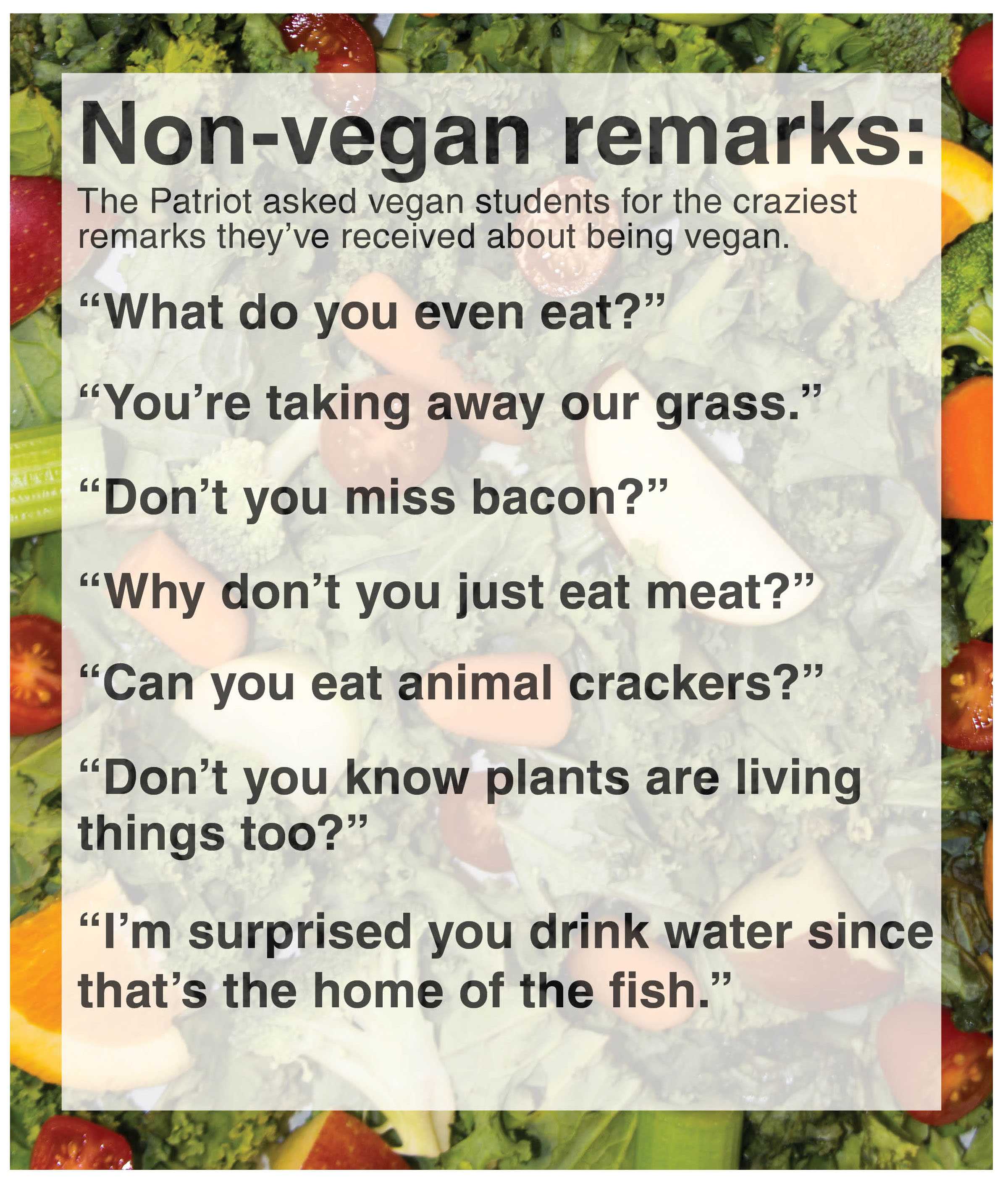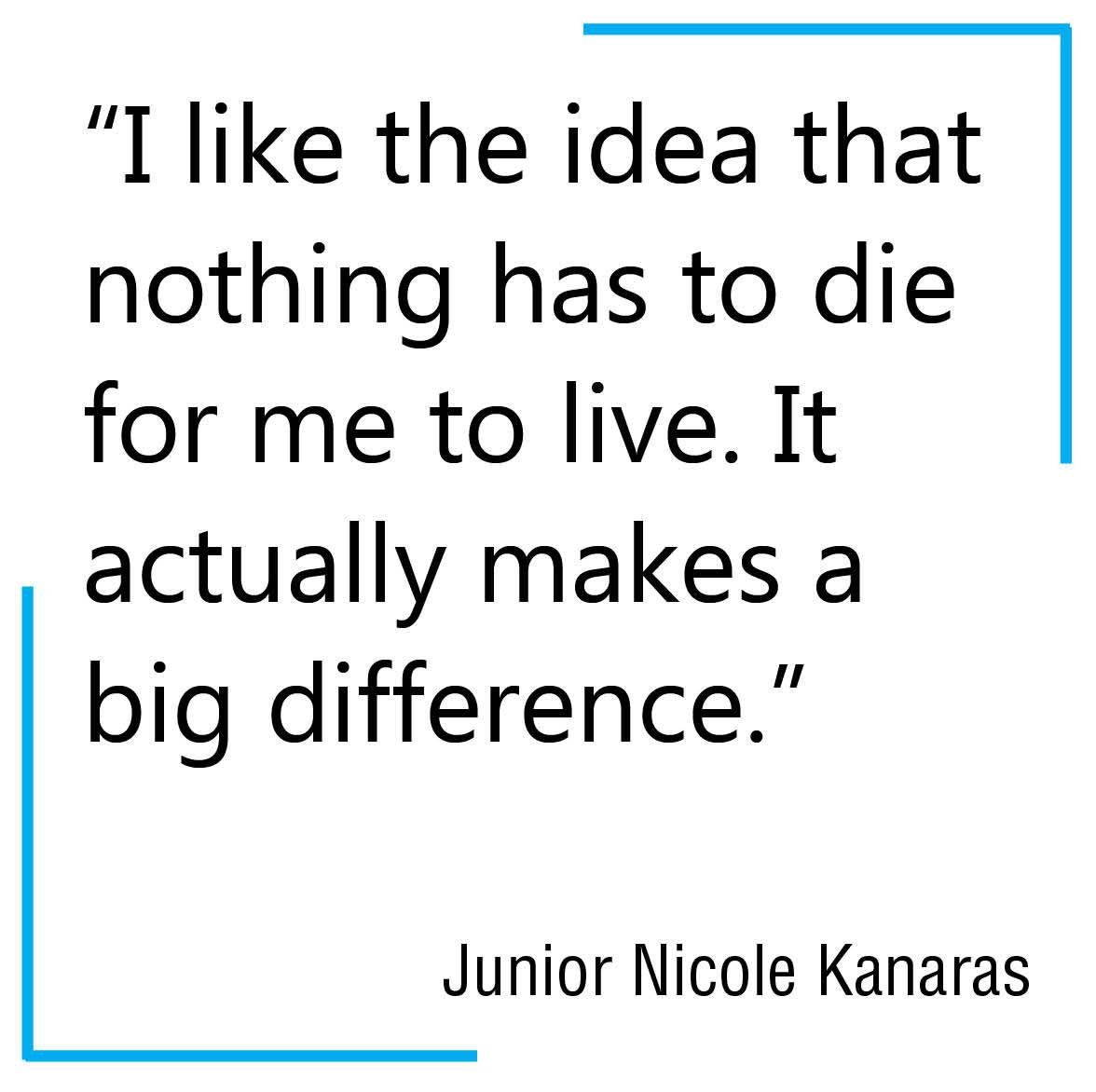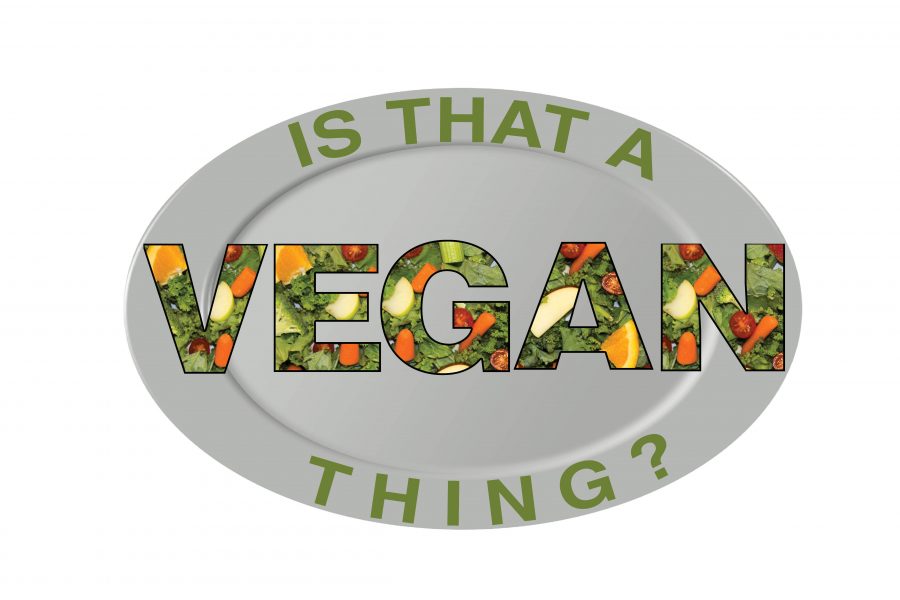Is that a vegan thing?
When vegans eat something curious, their peers can’t help but ask…
Junior Nicole Kanaras slowly makes her way through the cafeteria line, examining all of her options for lunch: a hamburger, chicken tenders, a grilled cheese, or a chef’s salad. Each of the foods in front of her have something in common: they contain animal products. Disappointed, she turns away and grabs only a bottle of water.
For the past eight months, Kanaras has followed a completely vegan lifestyle, which means no animal products in her food, cosmetics, or clothes. According to Vegan Peace, a website dedicated to animal rights, a vegan diet refers to “the practice of dispensing all animal produce, including meat, fish, poultry, eggs, animal milks, honey, and their derivatives” from your diet.
“I like the idea that nothing has to die for me to live,” Kanaras said in regards to her decision of becoming vegan. “It actually makes a big difference. By not eating eggs, you save animals every year because the demand is lower. People don’t realize that milking a cow takes away from baby calves. You’re saving more animals than you think.”
According to National Public Radio, a single vegan diet spares an average of 95 animals each year. Based on this calculation, each meat-eating person consumes about 7,000 animals over their lifetime.
Protection of animal rights is the underlying reason why many become vegan. Three and a half years ago, senior Annie Zickefoose decided to pursue a vegan diet after watching several documentaries and YouTube videos about the repercussions of eating animal products. “The documentary was so disgusting that I cried,” Zickefoose said.
Senior Delaney Link used to be a meat-lover until three years ago when she decided to try a veggie burger at Red Robin rather than a normal burger. This experience led to a three-year long vegetarian lifestyle.
She decided to switch to being a vegan after watching a documentary called “Vegucated,” which follows around three avid meat-eaters as they try a vegan diet for six weeks. “Vegetarian didn’t work out for me very well. [When I was vegetarian] I wasn’t focusing on getting my nutrition, and then when I went vegan, I really focused on eating every meal,” Link said.
Not only does veganism positively affect the supply and demand of animals, but it also affects the consumers themselves. According to the website Do Something, vegans, who make up five percent of the U.S. population, have a reduced risk of cancer, diabetes, obesity, and heart disease. However, the benefits of a vegan lifestyle don’t come easily.
According to Zickefoose, giving up certain foods was harder than expected. “I didn’t look for alternatives and just cut everything out,” she said. Yet, over time, she explained that she managed to find vegan products which made up for foods she missed.
Kanaras also found difficulty in the transition. “No one in my family is a vegan, so I have to make my own food. People tend to get frustrated because they never know what food to get me,” Kanaras said.
The typical vegan diet for Kanaras includes fruits and vegetables, but also beans, tofu, vegan cheeses, and soy milk. According to Kanaras, not all vegan foods are boring or plain.
“B en and Jerry’s makes vegan ice cream. There is stuff everywhere, but people tend to overlook it on the menu, or they think it is gross,” she said.
en and Jerry’s makes vegan ice cream. There is stuff everywhere, but people tend to overlook it on the menu, or they think it is gross,” she said.
Although there are many options for vegans, Kanaras believes JC has not been the most helpful in regards to providing these foods. “As far as the cafeteria, I don’t eat anything from there because there aren’t a lot of options. It’s the little things that are hard. You can get a salad, but dressings have milk or there is cheese,” Kanaras said. “[The cafeteria] is more accommodating to vegetarians, not vegans. It would be better with more options, but the vending machines are pretty good.”
Zickefoose and Kanaras reported feelings of judgement in the cafeteria from other students and even friends. According to Zickefoose, people often criticize and question her food choices, and she quickly got tired of arguing about it.
Even with the struggles of finding food or explaining her choices to the people around her, Link, as well as Kanaras and Zickefoose, is happy with the her vegan lifestyle.
“A lot of people don’t understand that I’m not judging people for eating meat. I personally just don’t eat meat, so they can agree to disagree about what I eat, since it’s my body, and I can eat what I want,” Link said.
Alyssa Kraus is a Copy Editor and Caroline Cooney is the Editor in Chief for The Patriot and jcpatriot.com.



